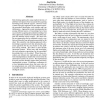Free Online Productivity Tools
i2Speak
i2Symbol
i2OCR
iTex2Img
iWeb2Print
iWeb2Shot
i2Type
iPdf2Split
iPdf2Merge
i2Bopomofo
i2Arabic
i2Style
i2Image
i2PDF
iLatex2Rtf
Sci2ools
108
click to vote
IJCAI
2001
2001
Integrating Expectations from Different Sources to Help End Users Acquire Procedural Knowledge
Role-limiting approaches using explicit theories of problem-solving have been successful for acquiring knowledge from domain experts1 . However most systems using this approach do not support acquiring procedural knowledge, only instance and type information. Approaches using interdependencies among different pieces of knowledge have been successful for acquiring procedural knowledge, but these approaches usually do not provide all the support that domain experts require. We show how the two approaches can be combined in such a way that each benefits from information provided by the other. We extend the role-limiting approach with a knowledge acquisition tool that dynamically generates questions for the user based on the problem solving method. This allows a more flexible interaction pattern. When users add knowledge, this tool generates expectations for the procedural knowledge that is to be added. When these procedures are refined, new expectations are created from interdependency m...
| Added | 31 Oct 2010 |
| Updated | 31 Oct 2010 |
| Type | Conference |
| Year | 2001 |
| Where | IJCAI |
| Authors | Jim Blythe |
Comments (0)

